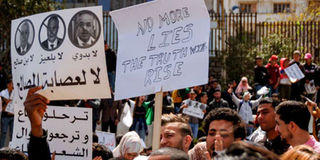Algeria: a year of anti-regime protests

Algerian demonstrators gather during an anti-government protest outside the Oran province government headquarters in its capital and northern coastal city of Oran on April 9, 2019. PHOTO | FILE | AFP
What you need to know:
- Here is a snapshot of how the year unfolded.
Mass demonstrations have rocked Algeria for the past year prompting the resignation of veteran president Abdelaziz Bouteflika, but the protest
movement continues to demand a complete overhaul of the political system.
Here is a snapshot of how the year unfolded.
On February 22, 2019, thousands demonstrate in Algiers and other big cities against Bouteflika's candidacy in a presidential election set for April.
The ailing 82-year-old, who has rarely been seen in public since a 2013 stroke, announces on February 10 he would stand for a fifth term.
"No fifth term!", chant protesters in the capital, where demonstrations have been banned since 2001. They hold new rallies on subsequent Fridays.
After losing the support of the powerful army chief, Ahmed Gaid Salah, Bouteflika decides on March 11 not to stand.
However, four days later "millions", according to diplomats, turn out for new demonstrations across most of the country.
Gaid Salah -- once considered loyal to Bouteflika -- demands that the president step down or be declared medically unfit to rule and on April 2 demands his impeachment.
In the following hours of April 2 Bouteflika resigns.
While crowds cheer his departure, they again fill the streets on April 5, to keep pushing for the total dismantling of the system in place since independence from France in 1962.
Upper house speaker Abdelkader Bensalah is on April 9 named interim president. Opposition parties refuse to confirm his nomination.
Gaid Salah emerges as the key powerbroker and on May 20 rejects protesters' key demands that an election planned for July 4 be postponed and that regime stalwarts depart.
The constitutional council on June 2 cancels the election for lack of candidates.
However, Algerians continue to protest massively in central Algiers. Men, women and children of all ages join the weekly demonstrations of the movement dubbed "Hirak".
On June 18, the military toughens its line, ordering police to block demonstrators from outside the capital entering Algiers for the Friday marches.
On September 25, a military court sentences Bouteflika's brother, Said, and two former intelligence chiefs to 15 years in prison for "conspiring" against the state. Their sentences are confirmed on appeal on February 10.
On December 10, former prime ministers Ahmed Ouyahia and Abdelmalek Sellal, who were both close to Bouteflika, get 15 years and 12 years respectively in corruption trials.
Other political and business leaders in Bouteflika's circle are also prosecuted.
On December 12, Abdelmadjid Tebboune, Bouteflika's former prime minister, wins the presidential election, amid record abstention.
The next day he calls for dialogue with protesters, who nevertheless remain on the streets.
"The vote is rigged. Your elections are of no concern to us and your president will not govern us," demonstrators chant.
On December 23, Gaid Salah dies from a heart attack, aged 79.
Protesters demonstrate on January 31, 2020, for a 50th consecutive Friday, vowing amid a heavy police presence to continue their movement.
In early February the CNLD prisoners' rights group says 142 Hirak members are still in preventive detention.





